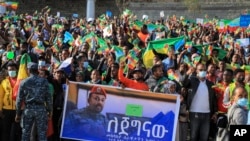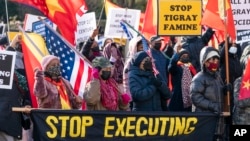Legislation has advanced in the U.S. House of Representatives to impose sanctions on Ethiopians committing human rights abuses, blocking food aid delivery, or taking other actions that are worsening the country’s 15-month crisis. It would also sanction those providing training, weapons, or financial support to those involved in the conflict.
The proposed Ethiopian Stabilization, Peace and Democracy Act was voted out of the House Foreign Affairs Committee on Tuesday. It can now be voted on by the full U.S. House. A similar bill is being considered in the Senate.
If enacted, the bill would sanction individuals as well as suspend U.S. security and financial assistance to the Ethiopian government until certain human rights conditions are met. It would also require the U.S. to oppose loans by international agencies such as the World Bank and International Monetary Fund to Ethiopia and Eritrea.
Congressman Tom Malinowski, a Democrat from New Jersey who co-sponsored the bill, said urgent action is needed.
“The war in Ethiopia has created one of the worst humanitarian crises in the world, and all the combatants, along with their foreign backers, are responsible for horrific abuses of basic human rights,” he said.
“Today, Congress is coming together to say that the conflict must end, and to hold accountable all those responsible for perpetuating it.”
The bill follows September sanctions and the November decision to suspend Ethiopia from the African Growth and Opportunity Act, which allows African countries’ exports duty-free access to the U.S. market.
One of the issues of ongoing concern to Congress is also the mass detention of Tigrayan civilians in several cities across Ethiopia, including the capital, Addis Ababa. Rights groups, including Human Rights Watch and Amnesty International, say ethnic Tigrayans have been targeted since the start of the conflict in November 2020, citing reports of forced disappearances and arbitrary arrests among other human rights violations.
“The mass detention of Tigrayan civilians in unlivable conditions is a human rights violation so outrageous that it demands a forceful U.S. response,” tweeted Congressman Brad Sherman of California, calling for action on what he called an atrocity.
The bill calls on the State Department to determine whether war crimes, crimes against humanity or genocide has been perpetrated by any party to the conflict. It also asks State to report on the role of foreign governments including those of China, the United Arab Emirates and Turkey in fueling the conflict.
The bill has drawn condemnation from the Ethiopian government and supporters in the global diaspora.
The American-Ethiopian Public Affairs Committee, a nonprofit diaspora organization that has supported the government during this conflict put the blame squarely on the Tigrayan People’s Liberation Front, which the government has designated a terrorist group, and armed forces in Tigray.
“This bill ignores the millions in Amhara and Afar … who were victims of the TPLF’s attacks,” the AEPAC said in a tweet.
The group further criticized the impact it would have on ordinary Ethiopians. “It will do nothing to repair the lives of those who have been left without loved ones or who have suffered serious injuries.”
Others in the Tigrayan diaspora have, however, supported the bill and previous U.S. sanctions on Ethiopian and Eritrean officials, including Omna Tigray, a nonprofit group consisting of Tigrayans residing in the diaspora who see the move as a way to protect the lives of civilians caught in the conflict.
Other analysts point to the effectiveness of earlier sanctions. Vanda Felbab-Brown, a senior fellow at the Brookings Institution, said that “the praiseworthy design of the sanctions regime avoids typical pitfalls.” She said that implemented sanctions are meant to give “legal exceptions for humanitarian relief delivery.”
U.S. President Joe Biden’s administration has emphasized the goal of targeted sanctions is to ensure perpetrators are held to account.
“These sanctions authorities are not directed at the people of Ethiopia or Eritrea,” a White House official said in September during a call with reporters. "The new sanctions program is deliberately calibrated to mitigate any undue harm to those already suffering from this conflict.”
The United Nations has said thousands have been displaced by conflict in the country, and more than 60,000 Ethiopians, mostly from the Tigray region, are seeking refuge in neighboring Sudan. The U.N. estimates that about 9.4 million people in northern Ethiopia’s Tigray, Amhara, and Afar regions are in dire need of humanitarian assistance.






